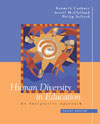 |  Human Diversity in Education: An Integrative Approach, 4/e Kenneth H. Cushner,
Kent State University, Kent
Averil McClelland,
Kent State University, Kent
Philip Safford,
Case Western Reserve University
The Classroom as a Global Community: Nationality and Region
Web LinksGlobalization For some further insights into issues of globalization, see the following: " Globalization and Human Rights" http://www.pbs.org/globalization/
Thomas Friedman and The Lexus and the Olive Tree For a brief biography and commentary on The Lexus and the Olive Tree,
see the following: Biography http://www.nytimes.com/library/opinion/friedman/bio_friedman.html Commentary, audio clips, excerpts http://www.lexusandtheolivetree.com/index.htm
The National Council for the Social Studies The NCSS is the major professional society for social studies teachers. While
the entire web site is worth exploring, the following portion provides the full
text of the NCSS position statement on K-12 global education, developed by the
International Activities Committee of NCSS: http://databank.ncss.org/article.php?story=20020402120154452
The Importance of Systems Thinking For a good brief summary of the importance of thinking about the interrelatedness
of people, events, and the planet, see the following on systems thinking: "Global Learning and Systems Thinking" http://www.globallearningnj.org/glean05.htm "What is a System?" http://www.globallearningnj.org/glean06.htm "Why Systems Thinking is a Critical Skill" http://www.globallearningnj.org/glean07.htm
Linking Students Around the World The Global Schoolhouse: "Linking Kids Around the World" is the motto
displayed on this website. The resources and information on the site enable
teachers, parents, and students to connect with classroom teachers and students
around the world, join existing global education projects (such as International
Schools CyberFair), or develop their own global education projects. http://www.gsn.org/ UNICEF: Voices of Youth http://www.unicef.org/voy/Live
from the World Youth Forum, THE MEETING PLACE is where you can share ideas about
important world issues, and where you'll find activities to do and problems
to solve. Teachers (and others) can also discuss global education and online
learning. Kidlink:www.kidlink.org/ Kidlink
is a non-profit grassroots organization aimed at getting youth through the age
of 15 involved in global dialog via public mailing lists, a private network
for real-time interactions such as chats, and an on-line art exhibition site.
Kidlink is supported by volunteers, mainly teachers and parents; over 100,000
children in 117 countries have participated in Kidlink since it began operation
in 1991. This website extensively describes the history and structure of Kidlink
and how to join.
The Pacific Circle Consortium The following web site is the home of the Pacific Circle Consortium http://home.hiroshima-u.ac.jp/pcc/
Studying the Global Environment The GLOBE Program: http://globe.fsl.noaa.gov/
Global Learning and Observations to Benefit the Environment (GLOBE) is a worldwide
network of students, teachers, and scientists working together to study and
understand the global environment. Students and teachers from over 7,000 schools
in more than 80 countries are working with research scientists to learn more
about our planet. GLOBE students make environmental observations at or near
their schools and report their data through the Internet. Scientists use GLOBE
data in their research and provide feedback to the students to enrich their
science education. Visit this site to take advantage of a broad range of information
resources, from GLOBE data to news bulletins, or learn how you can participate
as a student, an educator, or a scientist.
Teaching the Global Perspective The following web sites will be useful in getting an idea of the resources
available to teachers who are "thinking globally, acting locally:" United Nations Cyber Schoolbus – This is the United Nations global teaching
and learning site devoted to peace education. Curriculum, activities, and resources
on the United Nations (UN), numerous nations, and international events and days
of commemoration are available. Also featured is information on the Model UN,
a simulation of the UN system, and the UN Publications' Educational Bookstore.
www.cyberschoolbus.un.org The Center for World Indigenous Studies Fourth World Documentation Projecthttp://www.cwis.org This project provides
access to documentation on the social, political, strategic, economic and human
rights situations being faced by Fourth World nations indigenous peoples. American Forum for Global Educationwww.globaled.org/
The website of this non-profit organization provides information about the AFGE
listserv for discussion of ideas and practices in global education, materials
and programs for both the classroom and professional development, study tours
and other projects, and a publications catalog. Foreign Policy Association (FPA) www.fpa.org/
This non-profit, non-governmental, non-partisan educational organization aims
to educate Americans about significant world issues that affect their lives.
The "Great Decisions" program, which focuses on secondary, college, and adult
education about key foreign policy issues, is the core of the FPA's education
efforts. The website includes extensive information on FPA's various programs,
an opportunity to join the FPA on-line discussion group, and an on-line bookstore
of FPA publications. SPICEhttp://spice.stanford.edu
An outreach program of the Institute for International Studies (IIS) at Stanford
University, SPICE provides up-to-date curriculum materials on international
topics for grades 6-14. The SPICE website consists of an on-line version of
the SPICE publications catalog, which includes curricular materials on contemporary
world issues, world cultures, world geography, and world history. The site also
features the full-text of several free, introductory lesson plans, and the annual
newsletter "SPICE Connections."
|
|



 2003 McGraw-Hill Higher Education
2003 McGraw-Hill Higher Education